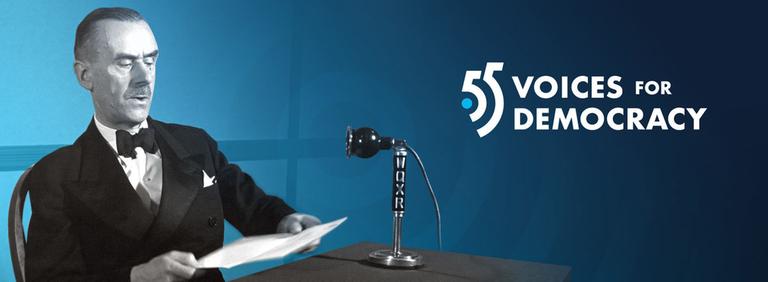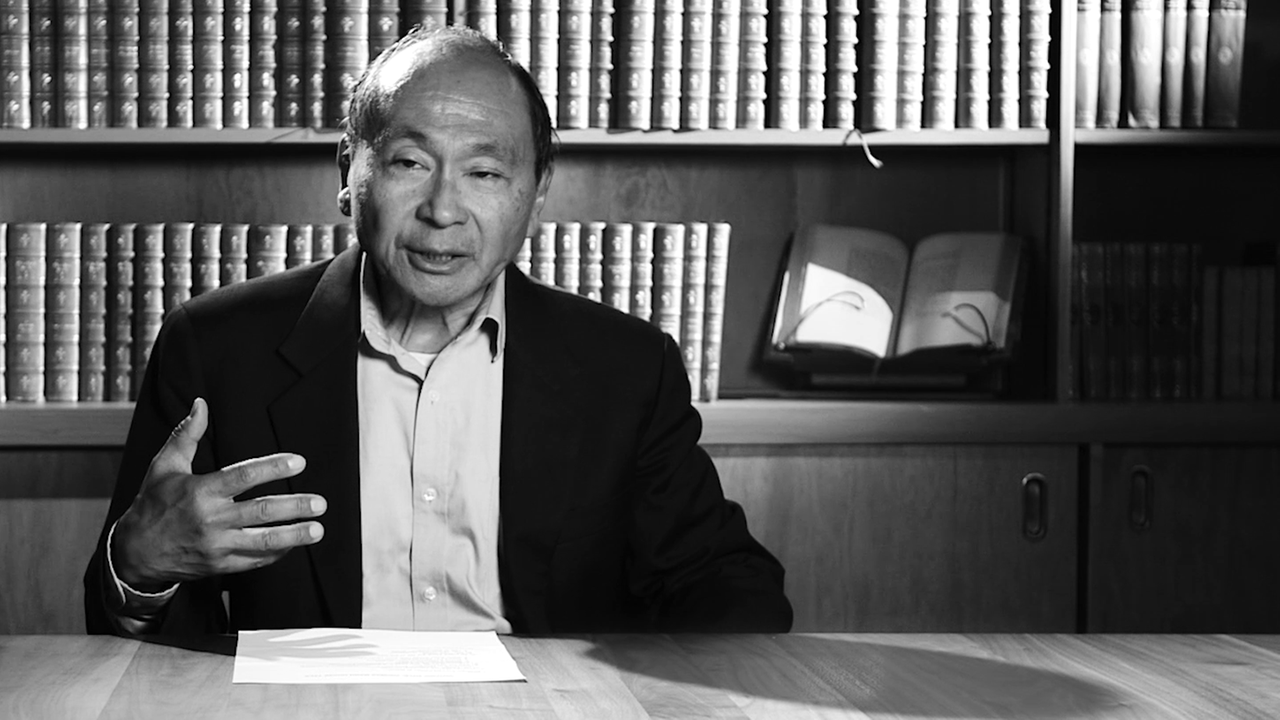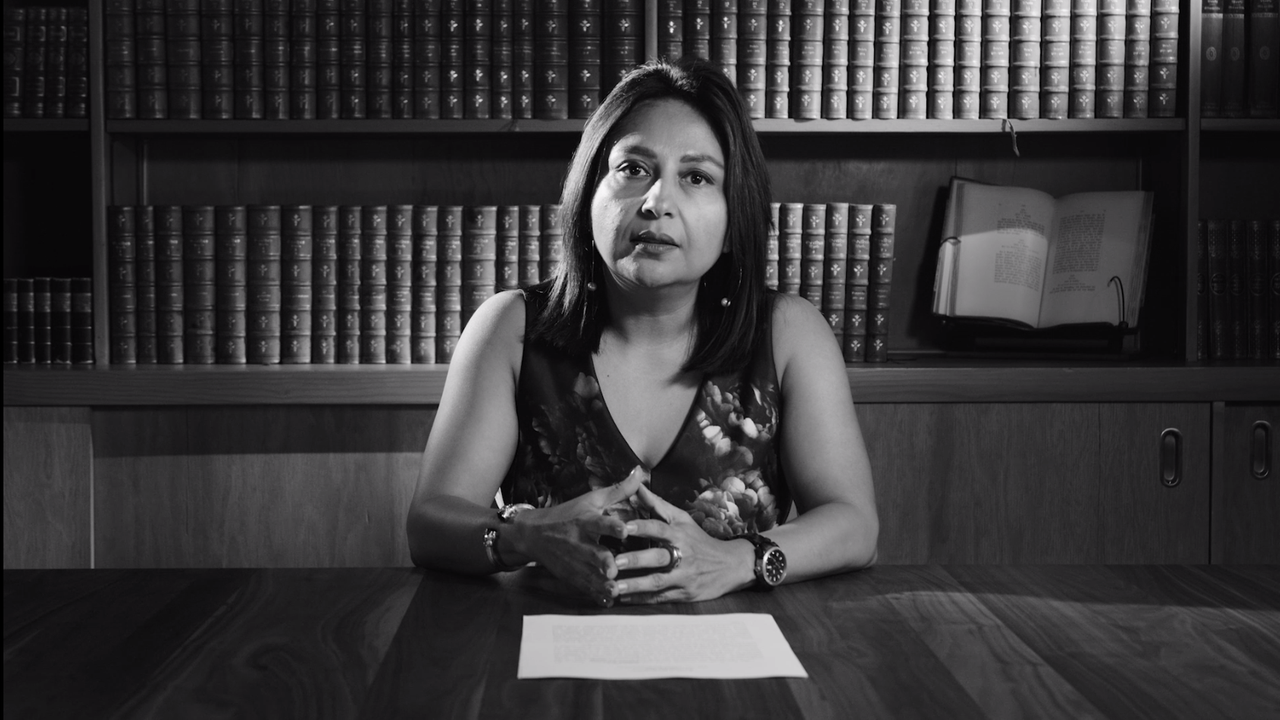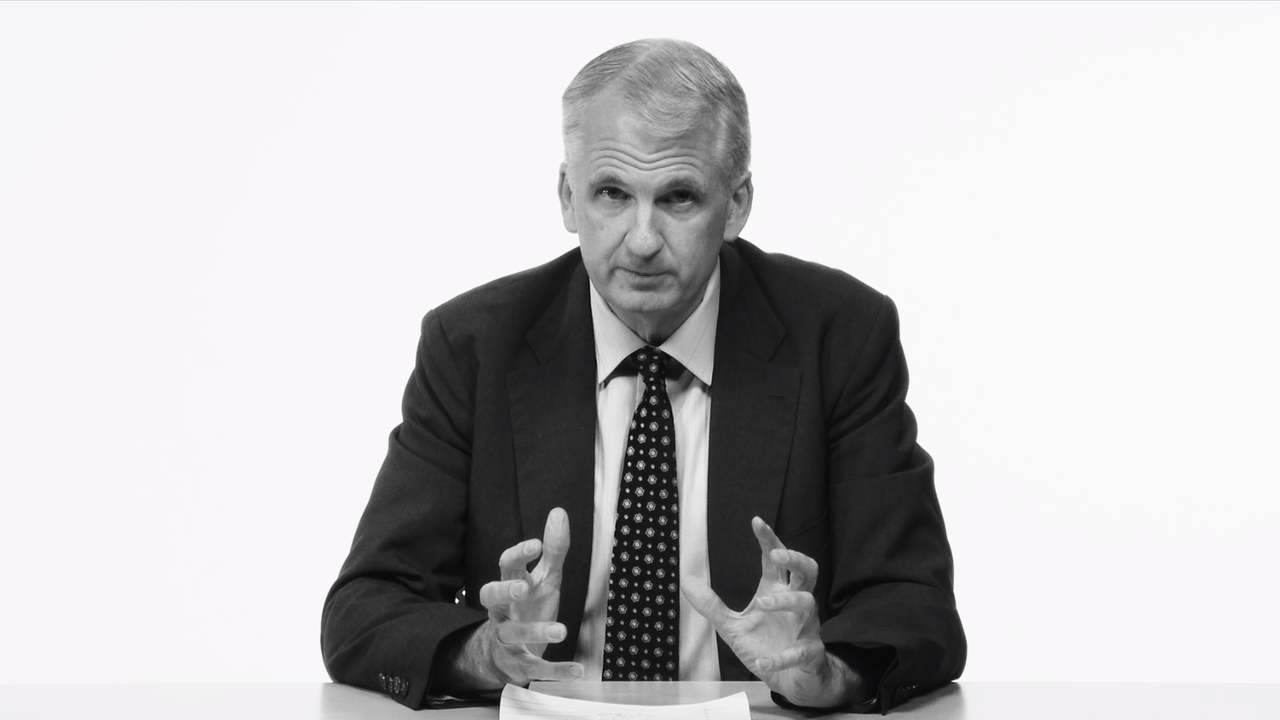"Deutsche Hörer!", unter diesem Titel richtete sich Literaturnobelpreisträger Thomas Mann zwischen 1940 und 1945 aus seinem kalifornischen Exil monatlich via BBC an Radiohörer in NS-Deutschland und rief auf zum Widerstand gegen das Nazi-Regime, die, so Mann, "Diktatur des Gesindels", und den "blutigen Komödianten" Hitler.
Mit der Reihe "55 Voices for Democracy" knüpfen das Thomas Mann House in Los Angeles, "Süddeutsche Zeitung, "Los Angeles Review of Books" und Deutschlandfunk nun an Manns Ansprachen an: 55 renommierte intellektuelle nehmen in monatlicher Folge an Thomas Manns einstigem Schreibtisch in Pacific Palisades, Kalifornien, Platz, um eine Rede über Demokratie zu halten.

Jan Philipp Reemtsma: Demokratie als minimaler Schutz vor Grausamkeit
(Rede in deutscher Fassung)
Worum sollte es einem gehen, wenn man sich für Demokratie rhetorisch ins Zeug legen möchte? Handelt es sich um ein "Projekt", wenn ja, um was für eins? Eines, um das es sich lohnt zu kämpfen? Bei Worten, hat ein kluger Mann einmal gesagt, tut man gut, alle Übergrößen zu vermeiden, und man sollte rhetorisch keine Krisen heraufbeschwören, nur um wie ein Kämpfer dazustehen. Nun sind Demokratien immer gefährdet, sie haben offene Feinde, oft bieten schlecht konstruierte Verfassungen Möglichkeiten, sie zu ruinieren. Man hört allerdings oft, die gefährlichsten Feinde der Demokratie seien lethargische und indolente Demokraten. Das mag sein, aber was ist denn sowas wie der oft beschworene "kämpferische Demokrat"? Bin ich so einer? Sind Sie es? Sollten wir sowas sein? Was wäre denn ein Demokrat, der sich nicht bloß so nennt, weil Demokratie die "am wenigsten schlechte Regierungsform" ist, von der man gehört hat, sondern der mit mehr Enthusiasmus aufzuwarten hat?
Die engagierten Demokraten des 18. Jahrhunderts, ob nun auf den Straßen vor den Mauern irgendeiner Bastille oder am Schreibtisch vor einem Blatt Papier, sagten, schrieben oder schrien, sie repräsentierten den "Willen des Volkes". Nach den Katastrophen des 20. Jahrhunderts zögern wenigstens die Nachdenklicheren, diese Formulierung zu gebrauchen. Karl Popper schrieb, dass Demokratie gar nichts mit irgendeinem "Willen des Volkes" zu tun habe, sondern uns die Möglichkeit verschaffe, eine Regierung ohne Blutvergießen loszuwerden. Eine sanftere Version dieses Gedankens stammt von Adam Przeworski: Demokratie sei ein System, in dem Parteien Wahlen verlieren können. Mir gefallen diese Definitionen, und ich denke, man sollte mit ihnen weitermachen.
Demokratie als Mittel zum Selbstschutz
Die große Philosophin Judith Shklar bestimmte die Idee der Demokratie andersherum. Entscheidend sei nicht allein, was Demokratie uns erlaubt, nicht tun zu müssen (wenn wir eine Regierung loswerden wollen), sondern wovor wir in einer Demokratie keine Angst zu haben brauchen. Sie sprach von einem "Liberalismus der Furcht". Die Idee der Demokratie, die von diesem Blick auf die Welt herstammt, besteht in dem einfachen Gedanken, dass wir unendlich viel gewonnen haben, wenn wir uns und einander erfolgreich vor dem Schlimmsten schützen können. Und "Grausamkeit", sagte Shklar, "ist das Schlimmste, was wir einander antun können" – und das Schlimmste, was uns widerfahren kann. Sie hat recht. Um uns vor diesem Schlimmsten zu schützen, müssen wir uns vor der Möglichkeit unumschränkter Machtausübung schützen und davor, dass Menschen eine Position in der Gesellschaft einnehmen können, in der sie unumschränkte Macht gewinnen können.
Demokratie in diesem Sinne ist ein Mittel zum Selbstschutz. Zunächst geht es um den Schutz von Minderheiten und zweitens um eine Art, wie die politischen Vorlieben von Mehrheiten durch Wahlen in politisches Handeln überführt werden können. Demokratie in diesem Sinne bedeutet: eine Verfassung mit garantierten Grundrechten für jeden und jede (ohne jede Ausnahme); ein transparentes Rechtssystem, das allen Schutz gewährt; Gewaltenteilung; ein unabhängiges System der Rechtsprechung; Redefreiheit , was heißt: freie und pluralistische Medien, die nur durch das Gesetz, nicht durch den Staat oder durch private Monopole kontrolliert werden. Politische Institutionen schließlich, die sich durch, wie man sagt, "checks and balances" einigermaßen selbst regulieren.
Mit "Demokratie" kann man sehr viel mehr an Hoffnungen verbinden, aber was auch immer die seien, ohne dieses Minimum können sie nicht gedeihen. Wenn wir davon sprechen, dass wir "die Demokratie verteidigen" wollen, müssen wir dieses Minimum meinen. Wir können meinen und hoffen, die Demokratie schaffe den fruchtbarsten Boden für eine pluralistische und bunte Gesellschaft oder für die uneingeschränkte Entwicklung kreativer Individuen. Das mag sein (und ich möchte hinzufügen: hoffentlich). Mag auch sein, dass manche demokratisch verfassten Gesellschaften graue, langweilige, vom Ideal der Durchschnittlichkeit beseelte Kulturen produzieren, weil ihnen interessante Exzentriker fehlen und Leute, die sich bemühen, diese zu fördern – aber darum geht es nicht, wenn wir über die Zukunft der Demokratie reden.
Weichgespülter abendländischer Herrschaftsanspruch?
Wenn wir das tun, diskutieren wir auch nicht über einen bestimmten kulturellen Hintergrund, nennen wir ihn "abendländisch", "afrikanisch", "asiatisch" – wie auch immer wir ihn nennen, darum geht es nicht. Wenn mich jetzt jemand unterbricht und sagt, dieser Gedanke sei nur eine Art weichgespülten abendländischen Herrschaftsanspruchs, antworte ich, dass ich diesen Verdacht verstehe und auch meine, daß dieser Verdacht zu Recht besteht und geäußert wird. Aber ich möchte darauf bestehen, dass der beste Weg, miteinander zu leben, nicht darin besteht, kulturelle Hintergründe für etwas zu halten, dem wir nicht entkommen können, sondern dass wir an Gesellschaften arbeiten sollten, in denen wir jeden kulturellen Hintergrund so ansehen können, als wäre er ein Stück weit unser eigener. Das ist anstrengend und braucht Zeit; aber Lernen ist doch eigentlich etwas, das Spaß macht.
Zurück zu einem Verständnis von Demokratie als einem Minimum von Selbstschutz gegen das Potenzial von Grausamkeit, das in unumschränkter oder wenigstens unzureichend kontrollierter Macht liegt – Grausamkeit von Folter und Schikane in Gefängnissen bis zur Verletzung von Menschen wegen ihres Aussehens, ihrer Sprache, ihrer Ansichten. Wir legen uns für dieses Minimum meist nur dann ins Zeug, wenn es in Gefahr ist. An vielen Orten dieser Welt ist es in Gefahr, viele Orte sind weit von seiner Verwirklichung entfernt; aber viele Orte sind stabile Demokratien dieser Art, ob man nun die Parteien oder Personen, aus denen ihre Regierung besteht, akzeptabel findet oder nicht. Wahrscheinlich leben die meisten, die diesen kleinen Vortrag hören oder lesen, an solchen Orten.
Jedes undemokratische Regime hat nur die Privilegien der Privilegierten gestärkt
Und die mögen ihn vielleicht zu defensiv finden. Tatsächlich ist die Idee von Demokratie, die ich hier vortrage, eine defensive. Nicht weil sie irgend schwach oder soll man sagen: kleinlaut wäre. Für alle, die eine Gesellschaft, in der die Stärksten, Brutalsten und Flegelhaftesten dominieren, fürchten – man überschaue die Geschichte, man sehe sich in unserer Welt um und braucht nicht zu suchen –, ist eine solche Idee nichts als selbstverständlich. Ja, es ist irgendwie unbefriedigend, das Selbstverständliche zu betonen. Aber wer das enttäuschend findet und möchte, dass ich jenseits dieses Selbstverständlichen noch dies und das und was immer ihr oder ihm am Herzen liegen mag, hervorkehre, bedenke, dass wir nur dann eine Chance haben, uns darüber zu verständigen, wenn wir es auf diesem sicheren Boden tun können. Für solche Debatten leben wir. Wer immer seine besonderen politischen oder kulturellen Ideen mag, aber die Vorstellung, dass über sie öffentlich debattiert wird, nicht, ist jedenfalls kein Demokrat oder keine Demokratin.
Aber ist die Idee politischer Gleichheit (und darauf beruht ja die Idee der Demokratie) nicht witzlos ohne wirtschaftliche Gleichheit und wird sie nicht durch jede Form sozialer und wirtschaftlicher Privilegien oder Diskriminierungen beschädigt oder zerstört? Seien wir ehrlich: Sie wird nicht nur tangiert oder beschädigt, sondern oft zerstört durch Ungleichheiten und Unterprivilegierungen. Seien wir vorsichtig: Man erkläre die Idee der Demokratie, wie ich sie skizziert habe, deswegen nicht für bloßes Gerede. Der einzige Weg, den wir kennen, Ungleichheiten und Diskriminierungen zu bekämpfen oder wenigstens ihre Auswirkungen zu minimieren, ist, das in demokratischem Rahmen zu tun. Das kann man wahrscheinlich doch aus der Geschichte lernen. Jedes undemokratische und autoritäre Regime hat nur die Privilegien der Privilegierten (manchmal der neu an die Macht gekommenen) stabilisiert und gestärkt.
Sie möchten eine glänzendere Rhetorik? Wenn Sie verstehen, dass Demokratie betreffend das Beste, was Sie bekommen können, dieses karge Konzept eines Schutzes der Bürgerinnen und Bürger vor Grausamkeit und unumschränkter Macht ist – dann verstehen Sie vielleicht auch, dass sie auf dieser Zurückhaltung von tönendem Pathos ruht.
Jan Philipp Reemtsma: Democracy and Emphatic Talk
(Englischsprachige Fassung)
What does it mean to speak about – and for – democracy in an emphatic sense? Is there a common let’s say: project we – we democrats – stand for and even would fight for in difficult and dangerous times? Hopefully we would do so. But we should not conjure up such times when they are not at stake just to dress up our democratic habits. Of course: democracy always was and is an endangered political concept. Endangered by its overt enemies, endangered by the misuse of power that of badly constructed constitution allows. We hear quite often that the most dangerous enemies of democracy are lethargic and indolent democrats. That may be, but what does it mean to be an emphatic and stubborn democrat? Am I a stubborn and emphatic democrat? Should I be one? What does it mean to be a democrat not only because one reasons that democracy is at least "the less bad constitution I’ve heard of" but because of some deep emotions?
The passionate democrats of the 18th century (whether they fought on the streets in front the Bastille or on their writing tables in front of a sheet of paper) wrote or said or shouted that they were the expression or personification of the peoples will. This was a consensus made by emphasis of style or voice. After the occurrences of the 20th century many people (or at least the thoughtful ones) became skeptical. Karl Popper wrote that democracy has nothing to do with the "peoples will" but it’s about the opportunities to get rid of a government without bloodshed. Or, in a milder version, democracy is a system in which parties loose elections, as Adam Przeworski has put it.[1] I have to confess that I like the definition and like to think further in that direction.
Democracy as political self-protection
The great philosopher Judith Shklar demonstrated the idea of democracy the other way round: democracy is not what we are not forced to do (to implement a regime change) but what it allows us not to be afraid of. Shklar referred to a "liberalism of fear". The idea of democracy that is derived from this way of looking at the world is that we have won a lot when we are successful in defending ourselves against the worst. "Cruelty", Judith Shklar wrote, "is the worst thing we can do", and she is right. To protect ourselves against cruelty means to protect ourselves against excessive power and everything that allows people to attain a position in society in which they can gain and execute excessive power.
Democracy in this sense is a means of political self-protection. It is, first of all, about the protection of minorities, and, second about how the will of the majority can be articulated and be transformed in political action in the process of voting. Democracy in this sense means: a constitutional state with guaranteed basic or fundamental rights for everyone (without any exception whatsoever), a legal system that guarantees protection and transparency; the separation of powers; an independent judicial system and jurisprudence; freedom of speech including independent free and pluralistic media, that are controlled by law but not by the state or private monopoly. Political institutions, no matter how they are constructed in detail, should be regulated by what has been called "checks and balances".
The idea of democracy can include much more but it must be based on this minimum. If we say that democracy has to be defended then we must mean defending this. We can think (and hope) that democracy is the best environment for developing a pluralistic and colourful society, or the best environment for developing the potentials of individuals. May-be - and I would like to add, hopefully - it is. May-be some democratic societies only produce a cultural environment that is grey and dull and full of average stuff because there’s a lack of interesting eccentrics who are protected and promoted by the people who can do so. In any case – that is not the question we debate when we debate the future of democracy.
When we debate the future of democracy we are not discussing a specific background culture, whether we call it Occidental, Asian, African – you name it, and I’ll say: no, that’s not what it’s about. And if someone tries to interrupt me and say that this idea is a camouflage for a kind of light version of an Occidental supremacy, I would answer that I understand the suspicion and accept the right of my opponent to be suspicious. But I would insist that the best way of living together is not to emphasize the different political cultures as something fixed as cages that we cannot open, but to create societies were we all can develop a habit of looking at every cultural background as if it were a bit mine. It needs work and patience, I know. But learning is fun.
Let’s return to the idea of democracy as a minimum of self-protection against the potential for cruelty that lies in the use of excessive or even insufficiently controlled power – cruelty from directly that ranges from harming people in jails or elsewhere to discriminating against them because of the way they look, speak, think or believe. I agree: we tend to express our emphatic convictions in heartwarming speeches about this idea only in such moments in which its realization is really endangered. At some places in our world it is indeed threatened, some places are far from being places where it has mere a chance of being realized. A lot of places, a lot of countries are stable democracies in this sense, whether you like the parties or people in government or not. And I think that the majority of people who will listen to this speech (or read it afterwards) are from to those countries.
Every authoritarian regime has improved the standard of living the privileged
They may find the way I talk in a way too defensive. Well, the idea of democracy I would like to promote is indeed in a sense defensive. Not because this idea is weak. For everyone who is afraid of a society in which the most strong and brutal and indecent people are in power – look around in history and in parts of our contemporary world and you will see the monuments to cruelty – it is self-evident. Of course, it is difficult and in a way unsatisfying to advocate what is self-evident. If you are disappointed by what I’ve said so far please consider: what you would like me to emphasize beyond this rather meager idea – we all only have the chance to debate this idea on this safe ground. Such debates are what we live for. Whoever wants to promote her or his ideas but doesn’t like the idea that they are being, will be or should be debated isn’t fond of democracy to say the least.
But isn’t the idea of political equality (and that is what the idea of democracy is based on) somehow pointless or futile without economic equality and isn’t it corrupted by any form of privilege and discrimination? Let’s be honest: it is not only affected but often damaged and sometimes demolished by privilege and discrimination. Let’s be careful: let’s not throw away the idea of democracy in the sense I’ve sketched above because admitting that this is true. The only way we know of fighting inequality and discrimination or at least minimizing their occurance and their consequences – and this is a knowledge derived from historical experience – is to work within the framework of democracy. No authoritarian regime ever helped to reach these ends. Every authoritarian regime has improved the standard of living the privileged (or sometimes the newly privileged) and stabilized the power of those who came to power through the regime.
You want a more emphatic talk? If you understand that the very best you can get is this meager idea – then you understand that all the emphasis you need is based on this lack of pathos.
[1] Zitiert nach Jan-Werner Müller, Furcht und Freiheit. Für einen anderen Liberalismus, Berlin 2019 S. 124.


